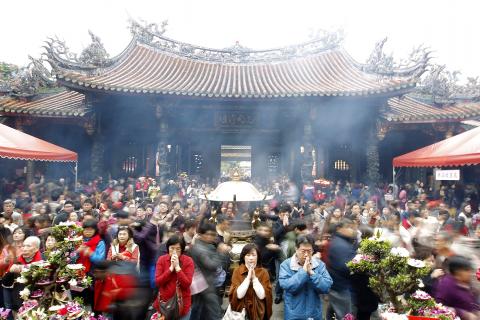One of the nation’s most important traditions creates mayhem in temples nationwide at midnight on Lunar New Year’s eve, as people flock to temples in the hope of being the first to put the first stick of incense of the year into the temple’s giant incense burner in the hope of ensuring good luck for the whole year.
Every year temples large and small are shrouded in a dense fog of incense smoke and packed with people praying for luck.
Thousands of people packed the outdoor square of Taipei’s Xingtian Temple (行天宮) before the clock struck midnight, waiting to race to the incense burner or simply to witness the spectacle.

Photo: Pichi Chuang, Reuters
“It’s horrible,” one person cried, stuck tightly into the crowd moving slowly toward the burner, each person holding several burning sticks of incense in their hands.
Others complained of a lack of order as people swarmed to reach the burner.
However, the race is not necessary, Taiwanese folklore expert Liu Huan-yueh said, because the first incense stick of the year is a personal thing and does not require being the first among thousands.
Many myths and legends surround the origin of Lunar New Year activities, including the most popular one — the tale of the monster “Nian” (年), which is a homophone for the word “year” in Chinese.
The Taiwan Folklore and Culture Research Workshop run by Providence University’s Chinese literature department says “Nian,” who is reputed to live in a deep mountain forest, is the reason that people in ancient China began to celebrate Lunar New Year.
The stories say the fierce beast would come out of hiding every spring to attack people, especially children, around the Lunar New Year. To scare it off, people would set off firecrackers to make noise, light fires and wear red.
In Taiwan, the origin of the celebrations emerged from the mythology of a “Sinking Land,” the Taichung-based workshop said.
According to Taiwanese folk legend, a lower-ranked god named “Lamp Monkey” (燈猴), which protects the light in household oil lamps, is said to have complained to the Jade Emperor (玉皇大帝) about the behavior of mortals.
Lamp Monkey, angry because mortals did not know he existed, accused humans of being ungrateful and unwilling to work hard. The emperor decided to sink Taiwan into the sea on the eve of Lunar New Year as a punishment.
Informed of the bad news, the island’s residents put on their best clothes and prepared the most luxurious foods they could find to share with family members and friends on what they believed was to be the last night of their life.
The feast developed into traditional family reunion dinner on Lunar New Year’s eve. The Taiwanese practice of staying up throughout the night with the family originates from the idea of people staying up waiting for the island to sink.
Legend says the Jade Emperor eventually canceled the punishment after finding out that Lamp Monkey had lied about humans’ lack of respect for the gods. To celebrate, the humans set off firecrackers, congratulated each other on their “rebirth” and visited temples to thank the gods for their blessings.

Chinese Nationalist Party (KMT) Chairman Eric Chu (朱立倫), spokeswoman Yang Chih-yu (楊智伃) and Legislator Hsieh Lung-chieh (謝龍介) would be summoned by police for questioning for leading an illegal assembly on Thursday evening last week, Minister of the Interior Liu Shyh-fang (劉世芳) said today. The three KMT officials led an assembly outside the Taipei City Prosecutors’ Office, a restricted area where public assembly is not allowed, protesting the questioning of several KMT staff and searches of KMT headquarters and offices in a recall petition forgery case. Chu, Yang and Hsieh are all suspected of contravening the Assembly and Parade Act (集會遊行法) by holding

PRAISE: Japanese visitor Takashi Kubota said the Taiwanese temple architecture images showcased in the AI Art Gallery were the most impressive displays he saw Taiwan does not have an official pavilion at the World Expo in Osaka, Japan, because of its diplomatic predicament, but the government-backed Tech World pavilion is drawing interest with its unique recreations of works by Taiwanese artists. The pavilion features an artificial intelligence (AI)-based art gallery showcasing works of famous Taiwanese artists from the Japanese colonial period using innovative technologies. Among its main simulated displays are Eastern gouache paintings by Chen Chin (陳進), Lin Yu-shan (林玉山) and Kuo Hsueh-hu (郭雪湖), who were the three young Taiwanese painters selected for the East Asian Painting exhibition in 1927. Gouache is a water-based

Taiwan would welcome the return of Honduras as a diplomatic ally if its next president decides to make such a move, Minister of Foreign Affairs Lin Chia-lung (林佳龍) said yesterday. “Of course, we would welcome Honduras if they want to restore diplomatic ties with Taiwan after their elections,” Lin said at a meeting of the legislature’s Foreign Affairs and National Defense Committee, when asked to comment on statements made by two of the three Honduran presidential candidates during the presidential campaign in the Central American country. Taiwan is paying close attention to the region as a whole in the wake of a

OFF-TARGET: More than 30,000 participants were expected to take part in the Games next month, but only 6,550 foreign and 19,400 Taiwanese athletes have registered Taipei city councilors yesterday blasted the organizers of next month’s World Masters Games over sudden timetable and venue changes, which they said have caused thousands of participants to back out of the international sporting event, among other organizational issues. They also cited visa delays and political interference by China as reasons many foreign athletes are requesting refunds for the event, to be held from May 17 to 30. Jointly organized by the Taipei and New Taipei City governments, the games have been rocked by numerous controversies since preparations began in 2020. Taipei City Councilor Lin Yen-feng (林延鳳) said yesterday that new measures by